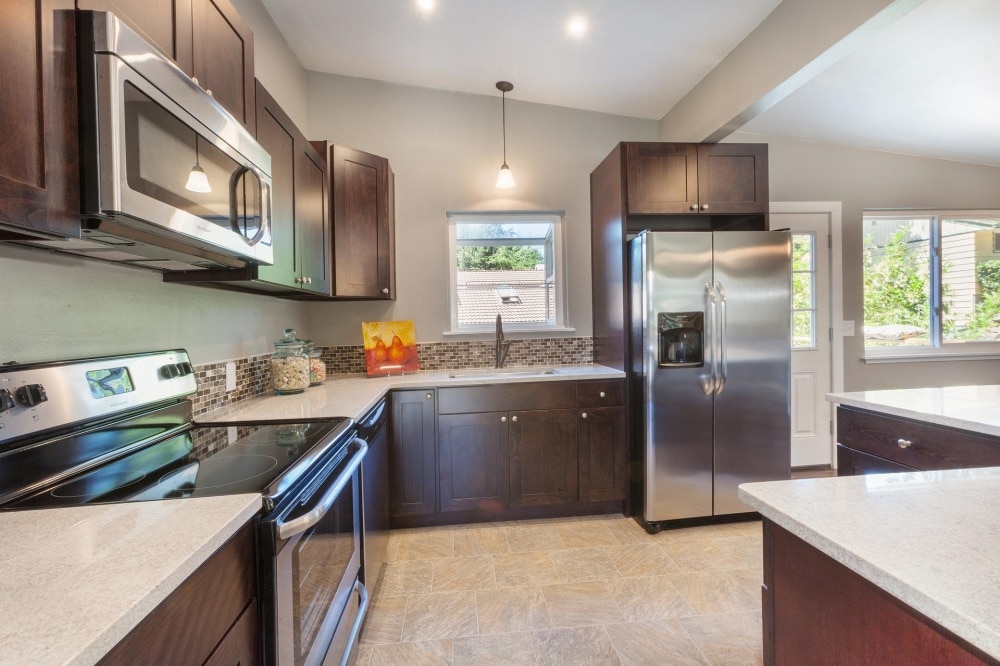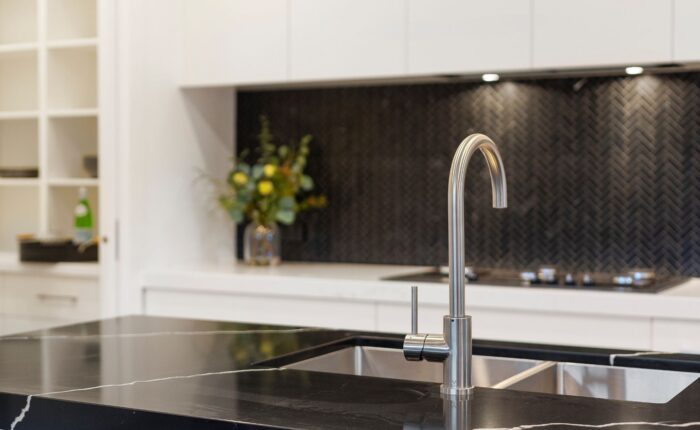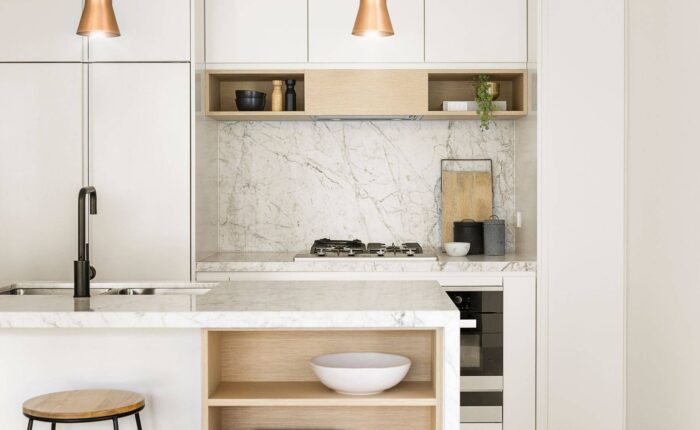Want to choose quartz worktops, but wondering about the most common quartz worktop pros and cons? If you’re thinking about remodeling or updating your kitchen, you probably already know that the most important step is picking out worktops. A worktop is the most critical surface in your kitchen. First of all, it’s where you’ll do all your work. Even if you aren’t a foodie and don’t like cooking much, you still need to pick a solid, high-quality surface in order to ensure your kitchen is long-lasting.
Secondly, a great worktop will become the new focal point of your kitchen. For example, premium quartz worktops can really change how your kitchen looks. Even if you’re opting for a quick and easy update of your kitchen by replacing your old laminate or wood worktops with quartz worktops, the difference will be staggering. Of course, remodeling the kitchen entirely or making a new one from scratch is a step up from that and a move that allows you to completely redesign the entire area.
Still, no matter which option you go for, picking natural stone worktops like marble or granite, as well as artificial quartz worktops, is definitely a move you want to make. But what are the common quartz worktop pros and cons compared to other worktop materials?
Let’s unpack this together, shall we?

Quartz Worktops — the Titan of Work Surfaces
When talking about the quartz worktop pros and cons, it’s first essential to note that you have to pick the right material for your kitchen and bathroom surfaces. Considering how often we use these two rooms, picking something durable that is also easy to maintain seems like a no-brainer. Plenty of materials are excellent contenders.
As we already mentioned, marble and granite, the two natural stones that you’ll usually find in high-end, luxury kitchens, are excellent picks. However, quartz seems to be growing in popularity lately and overshadowing the two previously more popular materials.
Why is that?
Considering all the common quartz worktop pros and cons, the benefits of quartz worktops and quartz, in general, have become apparent to a lot of people in the past decade or so. Thus, naturally, the demand for quartz worktops on the market continued to grow.
If we’re being fair, there are both pros and cons to quartz worktops. Although an excellent worktop material that will last you for years (even if you’re a bit negligent in the kitchen), quartz isn’t without its flaws.
Of course, in order to definitively say whether quartz is worth your time (and money), and determine the most important common quartz worktop pros and cons, we should first establish what quartz actually is.
What Is the Mighty Quartz (And Why Should You Care)?
Some of our clients come to us here at BucksMarble unsure about what quartz actually is. Over the past few decades, as the popularity of this stone grew, so did the price. Some people consider this to be a direct effect of a trend. However, the price is somewhat justified, when you consider how the stone is actually made.
Yes, quartz is an artificial stone. Now, while some might automatically assume that’s one of the cons of quartz countertops when discussing the quartz worktop pros and cons, it actually isn’t.
Although an artificial stone, quartz is mainly a natural material. As many of you know, quartz is a naturally occurring mineral. What’s more, it’s quite a common mineral and it’s mainly composed of silicon and oxygen. But, while quartz, the mineral, is naturally occurring, quartz countertops are man-made.
Quartz, the mineral, is, of course, the main component of quartz worktops. Making quartz worktops involves grinding down natural quartz into microscopic dust, adding other natural materials (such as marble and granite), and then adding synthetic materials. These synthetic materials, which make up around 5-10% of the final product, are resins and polymers as well as pigments that combine the natural stone and minerals together as well as give them a specific color and hue.
Due to the fact that the minerals are bound together by polymers and resin, the final product is extremely durable.

Quartz Worktop Pros and Cons: The Pros
So, now that we know how quartz kitchen countertops are made, we can understand some of the most specific common quartz worktop pros and cons, and especially the benefits and advantages. The unparalleled durability, as well as appearance, make quartz worktops extremely desirable. But is that all?
Of course not. Let’s take a deeper look at all the benefits of quartz, as part of the most common quartz worktop pros and cons.
It’s Long-Lasting and Dependable
We all know that our kitchens need to be durable. It’s where we spend a lot of our time when we share family meals, entertain guests and, of course, cook.
But cooking can sometimes be an extreme sport. Things fall down (sometimes a lot) and there are plenty of knives involved. Therefore, your working surface needs to be extremely resilient.
Ideally, you’ll want stone countertops that won’t scratch, crack, chip, or stain easily. First of all, countertops that are quick to show wear and tear don’t look as good after a while. However, more importantly, they aren’t as food-safe as the ones that are more durable.
As mentioned, quartz is extremely reliable, as this is a huge part of the common quartz worktop pros and cons, as one of its main benefits. Even though quartz hasn’t been on the market that long (definitely not as long as marble or granite), it’s an absolute champion when it comes to durability.
After all, it was created for that sole purpose.
Quartz Worktops Are Made To Last
Back in 1963, one of the most prominent Italian companies, Breton, wanted to make a long-lasting (pun intended) impression on the market and create something that was even more durable and resistant than stone. Because there’s a natural abundance of quartz on the market (as we said, it’s one of the most common minerals on earth), it was only natural to look into it for their project.
Luckily for them and all of us who now enjoy preparing our breakfasts on a quartz worktop, their theory about the usability of quartz was correct. The process of figuring out how to manufacture quartz wasn’t easy, but in the end, Breton managed to produce a whole array of different quartz surfaces with various colors and patterns.
Of course, the fact that they didn’t have to rely on Mother Nature when it came to the colors and patterns of the stone meant they had a leg up on the competition in the market.
Thus, quartz became extremely popular, making that one of its main benefits when debating the quartz worktop pros and cons. Of course, the fact that it rates between 7 and 10 on the Mohs scale of hardness also had a lot to do with its popularity. For reference, marble, which is arguably considered the most luxurious and desirable material for worktops, only rates between 3 and 5. So that’s one clear difference between marble and quartz, for example.
However, although extensively durable, it’s important to note that quartz isn’t indestructible, as these common quartz worktop pros and cons will show. There’s a very low chance that you actually manage to scratch or damage it, but it is possible, especially with materials that rate higher on the Mohs scale of hardness.
It Looks Amazing, And the Colour Selection Is Abundant
Aside from hardness, quartz also has a lot to offer when it comes to appearance. This is additionally one of the primary benefits to note when discussing the quartz worktop pros and cons. In a general sense, it’s quite similar to granite and marble. However, unlike natural stones, it has the massive advantage of having a more broad selection of colors and patterns.
Marble and granite slabs are unique. They are mined from the ground and what you mine is what you get (when it comes to color and pattern). You can’t influence the appearance of natural stone (given that it took millions of years for it to form). The situation is quite different with quartz.
Because quartz is made in a factory, and the manufacturing process involves pigments, you can theoretically make a quartz worktop that has any type of pattern, design, and color you can imagine.
It’s not just the pigments that make quartz worktops look amazing. Manufacturers also throw in some recycled glass and metal to add some shiny flecks to the material. When talking about the quartz worktop pros and cons, these are most definitely its advantages.
If you see something catching the light in a quartz kitchen, you’re actually looking at specks of glass and metal that were added into the quartz mass to create texture and pattern.

Quartz Worktops Are Non-Porous
When talking about the common quartz worktop pros and cons, we have to state that one of the better advantages of quartz worktops is that they’re non-porous. That means it doesn’t have microscopic pores where particles of dirt and food can enter and become a breeding ground for bacteria.
Both granite and marble countertops are porous. Of course, we’re talking about a very low level of porosity. However, because they are natural materials or, better said, stones that Mother Nature has been depositing for centuries, some porosity is to be expected.
What’s more, the porosity of natural stone worktops is easily fixable. All you have to do is seal the worktop. However, that just means you have another chore to think of every year.
Because quartz is a man-made stone, it’s also completely non-porous. The resin and polymers that bind the stone and the minerals also ensure the surface of the finished product is completely impenetrable. So, you don’t have to seal the material.
Because the material is impermeable, it’s also stain-resistant. That means there won’t be any staining or discoloration. These two issues can sometimes arise with marble and granite worktops (although it’s a rare occurrence). With quartz worktops, the material will look the same even after years of use.
This is a massive advantage of quartz when considering the common quartz worktop pros and cons, given that you really do want something that’s completely non-porous and food-safe in your kitchen.
There’s No Hassle With Maintenance
As mentioned, you don’t have to seal quartz worktops. The material is impermeable and non-porous. Therefore, maintenance is super simple. All you really have to do is wipe it down regularly and your quartz worktops will shine as brightly as when you installed them for years to come.
However, keep in mind that, although extremely resistant, quartz isn’t completely stain-proof. This is one of the primary disadvantages when it comes to quartz worktop pros and cons. Some chemicals can react with the synthetic materials that are in the quartz worktops and those reactions can lead to discoloration or staining.
So, pay attention to the cleaning products you use to maintain your worktops.
Quartz Worktop Pros and Cons: The Cons
Although we’ve been going on and on about how great quartz worktops are when talking about the quartz worktop pros and cons, we can’t really finish off this article without telling you about the disadvantages. There are only a few, but, in order to make an informed decision about your future worktops, you have to be aware of them.

It’s Not As Unique As Marble Or Granite Countertops
We already told you that the fact that manufacturers can manipulate the color and pattern of quartz is a huge advantage. We still stand by that statement. However, there’s another side to that coin, and when debating over the quartz worktop pros and cons, we have to talk about the design.
Marble and granite, although more limited in the selection of designs, are completely unique. One slab of marble, for example, will have a pattern on it that doesn’t have an exact replica anywhere in the world. Mother Nature rarely repeats herself, after all.
So, as these common quartz worktop pros and cons are now showing, quartz doesn’t have that level of uniqueness like natural stones do. Although you can order it in practically any color and pattern imaginable, you still won’t have a completely exclusive design.
Not So Affordable
We’ve been going on and on about the benefits of quartz. It’s durable, doesn’t stain, probably won’t crack, and it looks amazing. However, those benefits come at a price, and we have to focus on the disadvantages as well when talking about the common quartz worktop pros and cons.
Quartz isn’t cheap. After all, a lot of natural materials (as well as effort) go into making it. The fact that it’s the most long-lasting worktop material on the market has a hefty price.
If you’re on a tight budget, maybe quartz worktops aren’t the ideal choice for you. However, considering that they offer amazing value for money, they might be worth it on any budget.
This is why by understanding the quartz worktop pros and cons, you can make an informed decision that suits your preferences and requirements.
It Isn’t as Heat Resistant
One of the biggest downsides of quartz to note while discussing the quartz worktop pros and cons is that it isn’t as heat resistant as, say, concrete. The polymer and resin that are the composite materials of quartz are susceptible to heat damage. If you are interested in manufactured material worktops that can handle heat, porcelain is the way to go.
While the actual mineral quartz isn’t, a hot pan can still ruin your worktop.
Quartz Worktop Pros and Cons: Bottom Line
Is Quartz worth the money?
A material that’s as durable, gorgeous, and versatile as quartz is definitely worth the money. Once installed, quartz worktops can last you for years (if not decades). What’s more, because quartz is so desirable on the market, quartz worktops can also increase the value of your home. Remodeling your kitchen with quartz is equivalent to adding a few more square feet to your house.
Therefore, as these primary quartz worktop pros and cons are now displaying- quartz worktops are definitely worth it. If you want to add some to your kitchen, give us a call at 01494793515 or email us at info@bucksmarble.com to book your free consultation! The BucksMarble team will gladly beautify your kitchen.


